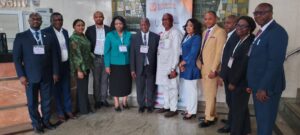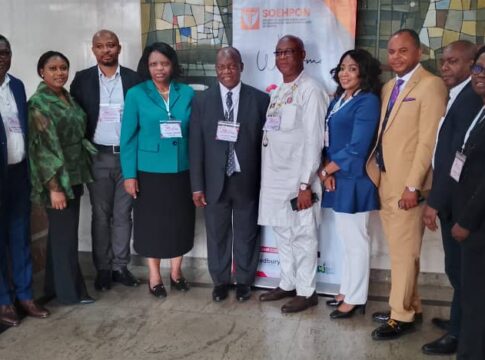President Bola Ahmed Tinubu has reiterated the Federal Government’s unwavering commitment to promoting occupational health, emphasizing its critical role in driving national economic growth and fostering social stability.
Speaking at the 2024 Scientific Conference and Annual General Meeting of the Society of Occupational and Environmental Health Physicians of Nigeria (SOEHPON) in Lagos, President Tinubu highlighted the importance of occupational health as a cornerstone of sustainable development. Represented by Mrs. Olabimpe Adenaike, South West Zonal Director of Environment at the Federal Ministry of Environment, the President underscored the alignment of this focus with the United Nations’ Sustainable Development Goal 8: Decent Work and Economic Growth.
“Occupational health is more than just workplace safety—it is a national priority that drives economic prosperity and social cohesion. A healthy, motivated workforce is the backbone of any thriving economy,” Tinubu stated.
Focus on Leadership, Advocacy, and Training
The conference theme, “Growing Occupational Health: Leadership, Advocacy, and Training,” resonates with the government’s “Renewed Hope Agenda.” This agenda prioritizes worker well-being, decent working conditions, and a productive workforce as key to economic growth.
President Tinubu outlined a three-pronged strategy to advance occupational health, centering on leadership, advocacy, and training:
- Leadership: Strengthening institutions like the Ministry of Environment and the Ministry of Labour and Employment to ensure robust oversight and enforcement of workplace health standards.
- Advocacy: Raising awareness about the importance of occupational health, workplace risks, and the shared responsibilities of employers and employees.
- Training: Implementing vocational and technical training programs under the Renewed Hope Agenda to enhance workforce skills and safety awareness.
“Healthy workers are not only more productive but also crucial to attracting foreign investment and upholding global labor standards. Reducing workplace injuries and illnesses is a priority for this administration,” Tinubu added.
Collaboration Across Sectors
The President called for collaboration among government agencies, industry leaders, and academics to create workplaces where health and safety are paramount. He stressed the integration of mental health policies into occupational safety frameworks, addressing stress and burnout issues that affect productivity.
Addressing Gaps in Occupational Health
Dr. Musa Shaibu, President of SOEHPON, highlighted the need to expand occupational health practices across various industries and sectors, especially the informal sector, where over 70% of Nigeria’s workforce is employed without adequate safety measures.
READ MORE: Dele Alake Demands N9bn Mining Budget Review to Boost Sector Growth
“In industries like construction, agriculture, and aviation, workers face significant risks daily. The informal sector, including mechanical workshops, often exposes employees to life-altering injuries due to the absence of safety protocols,” Shaibu explained.
He emphasized the need for strategic advocacy to convince industry leaders of the economic benefits of investing in occupational health. “Even simple interventions, such as basic training and awareness programs, can significantly improve workplace safety without requiring substantial financial investments,” Shaibu noted.
The Push for Legislative Action

Society of Occupational and Environmental Health Physicians of Nigeria (SOEHPON),
Dr Charles Babajide Onigbogi; National Secretary, SOEHPON,
Dr Ayo Agboola; LOC Member, Dr Obiageli Uriah; LOC Member, Dr Ikenna Ebuenyi; Chief Editor, SOEHPON Journal, Prof. Folasade Omokhodion; Chairman, SOEHPON BoT, Dr Peter S. Nmadu; President, Dr Musa Shaibu; Treasurer,
Dr Kemi Albert-Udoh; Chair, Scientific Committee, Dr Israel Iroezindu; LOC Member,
Dr Anyanate Ephraim; Assistant P.R.O., Dr Susan Dim, and Chairman, LOC, Dr Uche Enumah, during the closing ceremony of 2024 Scientific Conference and AGM of SOEHPON in Lagos.
A major point of discussion was the long-pending Occupational Health and Safety Bill, which has been delayed for over a decade. Shaibu urged the National Assembly and the President to prioritize its passage, explaining that the bill would establish a legal framework for enforcing occupational health standards nationwide.
“The bill’s enactment will ensure statutory guidelines for workplace safety, including regulations tailored to different industries and workforce sizes. This legislation is crucial for protecting workers and enhancing business outcomes,” he said.
Shaibu expressed optimism that the government’s participation in the event signaled renewed attention to the issue. “We are hopeful that the President’s involvement will accelerate the passage of this long-awaited bill into law,” he concluded.
A Vision for the Future
Shaibu reaffirmed SOEHPON’s dedication to ensuring that all Nigerians, regardless of their sector, benefit from occupational health protections. He outlined plans to expand the scope of occupational health services both horizontally—across more industries—and vertically, by increasing the depth and quality of services provided.
“With strong advocacy, legislative backing, and a commitment to education, we can transform occupational health standards across Nigeria. This will not only boost worker morale and productivity but also drive economic growth for the nation,” Shaibu emphasized.




